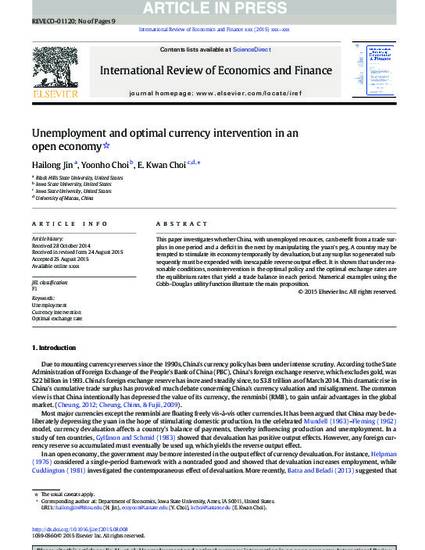
Article
Unemployment and optimal currency intervention in an open economy
International Review of Economics and Finance
Document Type
Article
Disciplines
Publication Version
Accepted Manuscript
Publication Date
1-1-2016
DOI
10.1016/j.iref.2015.08.008
Abstract
This paper investigates whether China, with unemployed resources, can benefit from a trade surplus in one period and a deficit in the next by manipulating the yuan's peg. A country may be tempted to stimulate its economy temporarily by devaluation, but any surplus so generated subsequently must be expended with inescapable reverse output effect. It is shown that under reasonable conditions, nonintervention is the optimal policy and the optimal exchange rates are the equilibrium rates that yield a trade balance in each period. Numerical examples using the Cobb–Douglas utility function illustrate the main proposition.
Creative Commons License
Creative Commons Attribution-NonCommercial-No Derivative Works 4.0 International
Copyright Owner
Elsevier Inc.
Copyright Date
2015
Language
en
File Format
application/pdf
Citation Information
Hailong Jin, Yoonho Choi and E. Kwan Choi. "Unemployment and optimal currency intervention in an open economy" International Review of Economics and Finance Vol. 41 (2016) p. 253 - 261 Available at: http://works.bepress.com/ekwan-choi/24/

This is a mansuscript of an article published as Jin, Hailong, Yoonho Choi, and E. Kwan Choi. "Unemployment and optimal currency intervention in an open economy." International Review of Economics & Finance 41 (2016): 253-261. doi: 10.1016/j.iref.2015.08.008. Posted with permission.